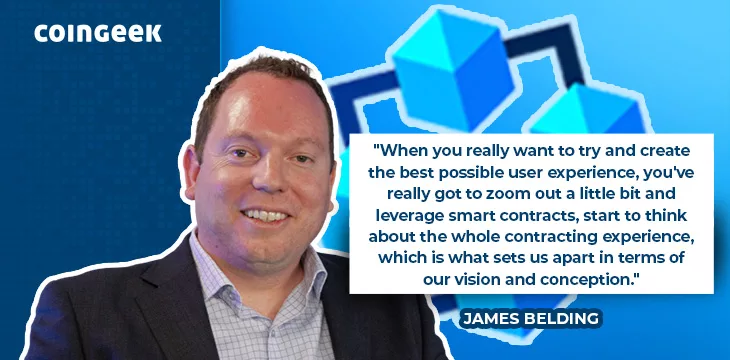|
Getting your Trinity Audio player ready...
|
“Contracting is a universal need,” says Tokenized CEO James Belding. Whether you’re an individual, small or large business, or other organization, you’ll need to do it at some stage—that is, organize your assets and actions as a collection of obligations. The best and easiest way to organize them is one where you can automate processes and make everything as efficient as possible.
Belding spoke with Brad Holland on the 5GOATs podcast about what Tokenized does and how he decided to create the company. 5GOATs is a marketing and communications strategy group specializing in consulting for Web3 businesses.
Traditionally, contracts set out obligatory actions for people and define the assets involved. And when we think of digital tokenization, it’s mainly in terms of the assets. But Tokenized says any and every aspect of a contract can be defined as a token, including intangibles like roles and responsibilities.
Tokenized “really takes the vision much further” than just contracts, Belding says. When you look at all the details, rights, duties, obligations, and people involved that sit within those contracts, there are a lot more opportunities for standardization and automation.
Because of this, his company’s mission is to create a user-friendly application that anyone can use in their own situation.
“When you really want to try and create the best possible user experience, you’ve really got to zoom out a little bit and leverage smart contracts, start to think about the whole contracting experience, which is what sets us apart in terms of our vision and conception.”
Tokenized (as the name suggests) takes different aspects of a contract and defines them as digital tokens on the BSV blockchain to make the process easier, more reliable, and more accountable. The target market is the mainstream, which can include anyone.
“You just said something I’ve never heard in any podcast before and that’s the word ‘mainstream,'” Holland says.
Ready for a Game-Changer? Our CEO @b_radlifestyle interviews @JamesBelding, CEO of @Tokenized_com, in our latest #podcast episode. Dive into the world of #RWA #tokenization and discover how Tokenized is reshaping fiance with their smart contract platform and “super financial app”…
— 5GOATs 🐐 (@5goatsxyz) September 26, 2023
The Tokenized interface starts users off by defining contract type and any assets, which “can be any type of legal or financial instrument you can think of.” The application includes several templates that describe these instruments, considering any common regulatory or legal issues involved in creating and issuing such things.
There are many complexities in ensuring everyone understands what they need to do, when certain actions are due, what your specific role is permitted to do, and what is considered satisfactory. These are the parts that can be automated with reminders and hints. A Tokenized wallet will do all this as well as keep your assets secure and can produce any necessary audits and reports with a simple request.
Why Tokenized needs to exist
Belding says part of his inspiration came from Elon Musk’s original vision for PayPal (NASDAQ: PYPL) as the “financial everything app”; something that takes a lot of separate and incompatible records and puts them in the same, more easily manageable, place. (Though thwarted at PayPal, Musk is now reviving that vision on a grander scale with X.)
“I guess there’s a personal interest in seeing this product exist,” Belding says. “I find it incredibly painful, and such a negative in my life, having to deal with reporting, and signing resolutions, and managing my investments—all those kinds of obligations we’re all familiar with. I thought, there’s a huge opportunity to make it better.”
The fundamental ideas of contracting have been around for a long time, he adds, and software has improved over the past few decades to automate them. The blockchain technology layer adds a solid timestamping function that removes “vendor lock-in” as well as political, jurisdictional, and organizational risks that come from digitizing the processes.
He says that while he shares Musk’s “super app” vision, he feels you need blockchain to make it comprehensive and workable. Belding and his team started with the front-end, or user experience, defining needs and potential efficiencies. From there, they studied blockchain capabilities and worked on ways their user-focused front end could integrate with them.
There are probably over 50 other teams worldwide working on the same problem, he says. But you’ll find most of them are absorbed more in the technical details of their chosen protocol (or trying to decide which blockchain protocol is best), while a separate team works on the user experience and another on the integration issues between these layers.
The protocol has the ability to integrate with local regulations and functions (e.g., reporting, identity, taxes, etc.) as well as recording all obligations and actions. Blockchain records everything “in a more robust way”, and by creating standards compatible with external systems (reducing the “vendor lock-in” issue mentioned above). It also allows more control over what information is public and what remains private while maintaining the ability to prove its existence.
Without mentioning the BSV blockchain by name, Belding concludes by describing why a proof of work (PoW), permissionless (i.e., not privately owned or controlled) blockchain is essential. PoW secures its data records through the economic incentives of a voluntary “mining” (processing) network. An open/permissionless network with set protocol rules means everyone understands what kind of platform they’re building on, with the reassurance those rules won’t change at some point.
CoinGeek Conversations with James Belding: Tokenized was built with blood, sweat and tears

 02-18-2026
02-18-2026 




